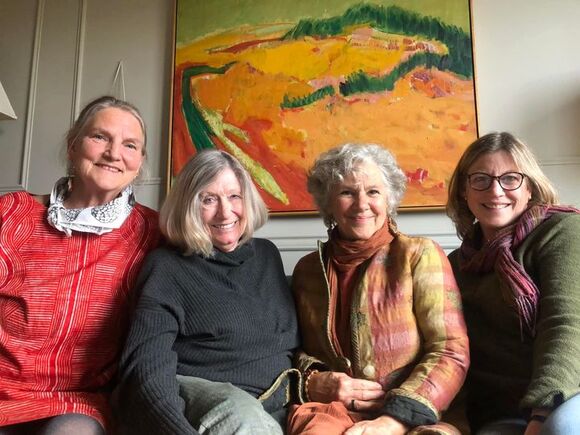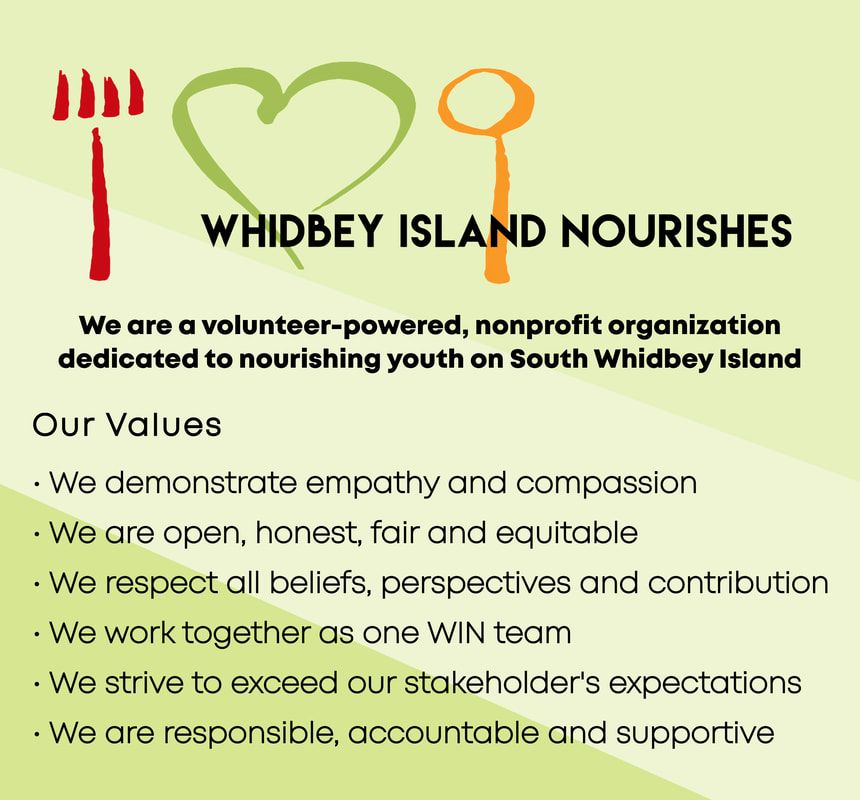WHIDBEY ISLAND NOURISHES - WIN
|
While participating in a Power of Hope program on Whidbey Island in 2007, South Whidbey resident Mary Fisher learned that there were over 60 known homeless teens on the island's south end. Concerned about how they were getting fed, Mary rallied friends Dorit Zingarelli, Shirley Collins, and Jonni Reed to help prepare meals. They connected with the Good Cheer Food Bank, and other community members, who shared ideas for the best way to reach young people who were couch-surfing or living in the woods. With information provided by Good Cheer, the Family Resource Center, and Seattle's Operation Sack Lunch, the team decided that ready-to-eat lunches would be the best way to approach the need they had identified, a need not met by other South Whidbey groups.
|
Today, our programs serve more than unhoused teens - reaching children old enough to eat solid food through age 18. Thanks to our generous donors and committed volunteers, our programs have grown, been adapted, and continue to be refined to best serve our client base while complementing other community services.
We are committed to ensuring that South Whidbey young people have access to the healthy food they need to thrive, and we hope you'll join us in the work we do.
We are committed to ensuring that South Whidbey young people have access to the healthy food they need to thrive, and we hope you'll join us in the work we do.
EVERY CHILD DESERVES TO BE NOURISHED
WIN and GOOSEFOOT
In 1999, South Whidbey residents Nancy Nordhoff and Linda Moore's sense of community and desire to preserve it gave birth to Goosefoot. The goal - to work in partnership with the community to enhance the cultural, environmental, and economic vitality of South Whidbey and help make it a great place to live for all residents. Over the following years, Goosefoot addressed community needs, funded local nonprofits, supported local business growth, preserved great places, connected neighbors to nurture a sense of place and community, preserved the rural landscape, and enhanced local commerce.
In 2017, Goosefoot changed its tax-exempt status from a private operating foundation to a Type 1 Supporting Organization to better fulfill its philanthropic role. Three nonprofits were invited to join Goosefoot as Supported Organizations: Whidbey Watershed Stewards, Whidbey at Home, and Whidbey Island Nourishes. These three nonprofits are each represented by two members on the Goosefoot Board.
As members of the Goosefoot board, WIN representatives help to identify South Whidbey's most urgent needs and build solutions. WIN, as part of the Goosefoot board, is working for the best possible future for our corner of the world.
In 2017, Goosefoot changed its tax-exempt status from a private operating foundation to a Type 1 Supporting Organization to better fulfill its philanthropic role. Three nonprofits were invited to join Goosefoot as Supported Organizations: Whidbey Watershed Stewards, Whidbey at Home, and Whidbey Island Nourishes. These three nonprofits are each represented by two members on the Goosefoot Board.
As members of the Goosefoot board, WIN representatives help to identify South Whidbey's most urgent needs and build solutions. WIN, as part of the Goosefoot board, is working for the best possible future for our corner of the world.
WIN and the SOUTH WHIDBEY SCHOOL FARMS PROGRAM
The South Whidbey School Farms (SWSF) Program, established by Cary Peterson in 2014 on the grounds of the South Whidbey School District's South Campus, quickly became a dynamic space for learning and student engagement. As more of the Farms' activities evolved into farm-to-classroom curriculum and students had increased exposure to the healthy produce they were growing, Cary created a Farm Leadership Team with representatives from SWSF, the District, and WIN. Early on, the Team recognized a disconnect - students would eagerly eat fresh vegetables right off the plant while they were with their classes at the Farm but would dismiss or ignore those same vegetables when offered to them in the cafeteria (either cooked or as part of a salad bar). In response, culinary classes and other cooking and tasting opportunities were created to help students connect to veggies outside of the Farm and to healthy eating in general.
SWSF has become an integral part of the student's school experience, and eating fresh vegetables is as fundamental to the program as growing them. SWSF's Culinary Program and WIN's Snack Programs only add to South Whidbey Schools' healthy eating culture.
In 2023, WIN became the fiscal sponsor of SWSF, further helping support the robust connections that students are making to good nutrition and healthy eating.
SWSF has become an integral part of the student's school experience, and eating fresh vegetables is as fundamental to the program as growing them. SWSF's Culinary Program and WIN's Snack Programs only add to South Whidbey Schools' healthy eating culture.
In 2023, WIN became the fiscal sponsor of SWSF, further helping support the robust connections that students are making to good nutrition and healthy eating.



